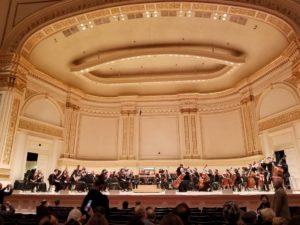CULTURE Victor Emmanuel III’s body returned to Italy while Aldo Finzi’s music played at Carnegie Hall
Over the weekend, the remains of Victor Emmanuel III, the king of Italy who signed Mussolini’s Racial Laws in 1938, were flown back from Egypt to Italy for reburial. The remains, together with those of Queen Elena’s, are now at the Sanctuary of Vicoforte, a small town near Turin, in northern Italy.
While Italy was paying homage to a man who had the power to oppose Fascism, but chose to passively allow the regime to take over his country, Carnegie Hall last night paid homage to a man whose career was brutally interrupted by such bigotry.
Victor Emmanuel III reigned in Italy for 46 years. He is infamous for silently supporting the Fascist dictatorship of Benito Mussolini, who came to power in the early 1930s. In 1938, the king signed the “laws for the defense of the race,” a set of laws which targeted the Italian Jews and the African residents in the Italian colonies in Africa. After the war, in 1946, he abdicated and went into exile in Alexandria, Egypt, where he died one year later.
Members of the royal family visited the Sanctuary of Vicoforte on Monday to pay homage to the king’s body. His grandson Emanuele Filiberto, who is also a reality TV star in Italy, said that he believed that the king and the queen should be reburied in Rome’s Pantheon.
The Racial Laws, which Victor Emmanuel III chose to support, prohibited all public administrations to employ Jews and barred them from attending public schools and participating in the public, academic, or artistic spheres.
One of the thousands of people affected by the Racial Laws was Aldo Finzi, a talented composer born in Milan from an old Italian Jewish family at the end of the 19th century.
In 1937, when the Scala Theatre announced a competition for a new opera to be performed during the following season, Finzi entered with his opera La serenata al Vento. A member of the jury privately told Finzi that they had chosen him as the winner. But the Fascist government, unhappy with the decision, intervened in order to prevent a Jew to win. In response, the theatre chose not to present the award at all that year.
After the Nazis occupied Italy and began persecuting the Jews, Finzi went into hiding with his family in Turin. He died in 1945 of a heart attack and his work has remained mostly unknown. His family recalls that before dying, Finzi said: “Fate eseguire la mia musica,” meaning, “have my music performed.”
Last night, the family fulfilled his wish. The Garden State Philharmonic performed selected pieces from Finzi’s work on Carnegie Hall’s Perelman Stage in New York.
During the evening, the orchestra played several excerpts from La serenata al Vento, the opera which almost made it to La Scala. The two-hour-long performance ended with a triumphant rendition of the symphonic poem Cyrano di Bergerac, during which the orchestra played the sistrum, an ancient percussion instrument that is rarely used.
Carnegie Hall celebrated a man who could have become one of the 20th century’s greatest Italian composers. On the contrary, by facilitating the return of Victor Emmanuel III’s body, Italy paid homage to a man who refused to oppose Fascism.
“No one can forget what he did and what he did not do but should have done,” Aldo Finzi’s grandson, who is also called Aldo Finzi, told the Transatlantic. “No one can forget his very serious treason towards the Jews.”
Finzi also noted that the king’s private and public personas should be detached.
“Victor Emmanuel III was an accomplice of that Fascist regime,” wrote the president of the Union of Italian Jewish Communities, Noemi Disegni, in a statement. “Italy cannot and should not forget.”
*This article was published on the New York Transatlantic on December 18, 2017.

